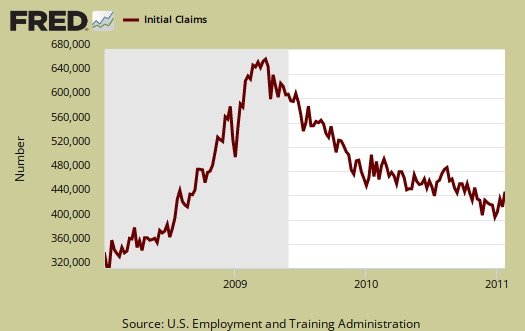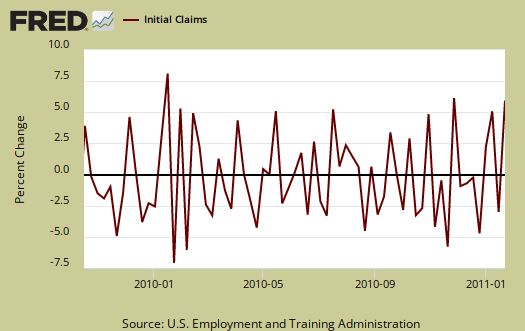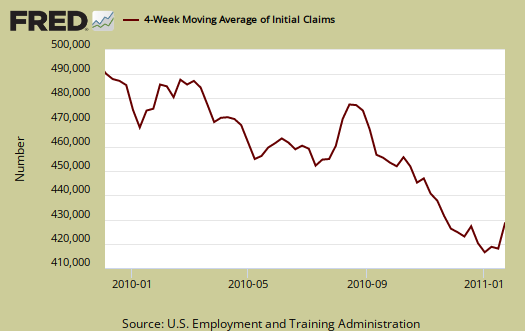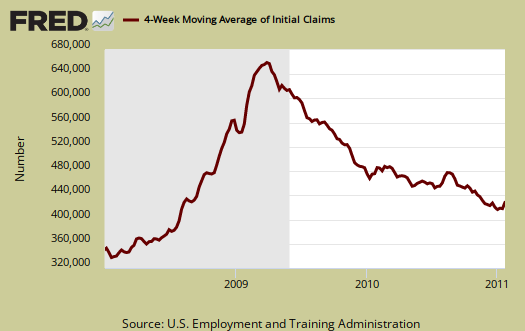Initial weekly unemployment claims increased to whopping 454,000 this week. Last week was revised to 413,000, up 9,000. Seems the U.S. just cannot get below that magic number of 375,000 people per week applying for unemployment benefits. More details below.

From the jobless claims report:
In the week ending Jan. 22, the advance figure for seasonally adjusted initial claims was 454,000, an increase of 51,000 from the previous week's revised figure of 403,000. The 4-week moving average was 428,750, an increase of 15,750 from the previous week's revised average of 413,000.
Bear in mind initial unemployment claims are seasonally adjusted. Here are the raw totals:
The advance number of actual initial claims under state programs, unadjusted, totaled 482,399 in the week ending Jan. 22, a decrease of 67,491 from the previous week. There were 502,710 initial claims in the comparable week in 2010.
The thing to note is how initial claims are almost identical to a year ago. Surely America has run out of people to fire by now so why are initial claims staying stuck at record highs?
The 4 week average, now at 428,750, has incorporated in it the December outliner data point of a 410,000 weekly report, the 413,000 figure from last week, in addition to the above.
Below is the mathematical log of initial weekly unemployment claims, so one can get a better sense of the rise and fall of the numbers. A log helps remove some statistical noise, it's kind of an averaging. As we can see we have a step rise during the height of the recession, but then a leveling, not a similar decline. We have this yo-yo bobblehead, over 400,000 every week on initial claims, never ending labor malaise.

Below is a graph of the percent change in initial weekly unemployment claims for the last year. Look at how the numbers change bobs around zero, up and down, like a yo-yo.

Below is the 4 week moving average, set to a logarithmic scale to remove even more statistical noise, for the last year. Look at how the log of the 4 week average stays elevated. We need this metric to drop below 400,000 and keep dropping. Numerous economists say the number is 375,000 to show job growth. We see a strong decline, but then again, hasn't everyone in America been fired by now?

Below is a 2 year view of the 4 week moving average, set to a log scale.

The total number of people claiming benefits in all programs for the week ending Jan. 8 was 9,410,977, a decrease of -223,826 from the previous week.
Last week's unrevised overview is here.

unemployment number
When I hear that we added 110,000 jobs last month say. Is this jobs added minus people entering the workforce and folks who lost their jobs or just jobs added? When Bush was in office the number of 300,000 jobs added per month was given (not by EP) just to keep up with people entering the work force, now I've heard that number needed as 150,000. Which is it? Either way we would still be years (likely never) getting back to full employment.
December unemployment report
The January numbers are out Friday, which is the monthly BLS unemployment report, where the official unemployment rate comes from.
Here is the EP overview of that report.
It's assuredly not 150,000, but the number is depending really on increasing working age population growth and there is an additional problem, in that the labor participation rate isn't exactly telling you how many people really need a job, because they have given up and are not counted.
I'll make a point next Friday to calculate out what the current "jobs needed just to keep up" number based on civilian population growth with current participate rate.
I have some of these calculations in there but the above link goes through some of the definitions so you can see where this guesstimate is coming from and it changes depending on which economist you listen to who wants to ignore the people now in desperation, destitution and poverty, who really can work and should be working. Some of the numbers are impossible, such as how many guest workers or illegals there are in the U.S. workforce....
and what is the increase, i.e. I don't think most Americans believe we should be creating jobs for those folks while our folks are going into poverty and economic destitution.